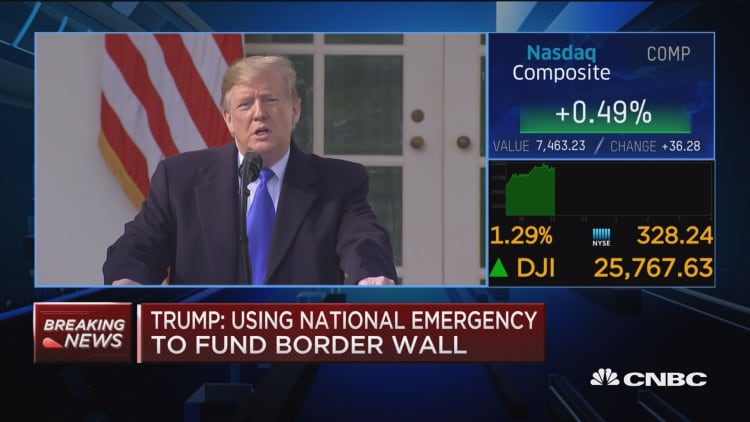
President Donald Trump said Friday that he anticipated his national emergency declaration would be rejected by multiple federal courts but ultimately upheld by the U.S. Supreme Court.
In blunt remarks, delivered in the White House Rose Garden, Trump outlined a legal strategy based on the playbook his administration used to successfully defend its travel ban.
"We will have a national emergency, and we will then be sued, and they will sue us in the 9th Circuit, even though it shouldn't be there, and we will possibly get a bad ruling, and then we will get another bad ruling, and then we will end up in the Supreme Court," Trump said, his voice animated by an annoyed lilt.
Good-governance groups have already promised litigation over the president's emergency declaration, which the White House has said is necessary on humanitarian and national security grounds. Trump seemed to downplay that reasoning Friday by saying he "didn't need to do this, but I'd rather do it much faster."
Hopefully we will get a fair shake, and we will win in the Supreme Court, just like the ban.President Donald Trump
The president's comment is likely to emerge in litigation challenging his reasoning for the ban, just as comments he made about his administration's travel ban — as well as a number of inaccurate and inflammatory anti-Muslim posts on Twitter — were cited in those challenges. Importantly, though, Chief Justice John Roberts brushed aside the significance of Trump's comments in his opinion upholding the travel ban, noting that the "text says nothing about religion."
That ban, a signature aspect of the president's foreign policy, blocked visitors from a number of majority-Muslim countries from entering the United States and was challenged on the grounds that it was motivated by religious discrimination. A version was upheld by the justices over the summer in a 5-4 ruling that fell along party lines.
Trump cited the decision Friday when he declared a national emergency over illegal immigration.
"Hopefully we will get a fair shake, and we will win in the Supreme Court, just like the ban," Trump said. "They sued us in the 9th Circuit, and we lost, and then we lost in the appellate division, and then we went to the Supreme Court, and we won."
Trump vs. the 9th Circuit
Trump has often accused the U.S. 9th Circuit Court of Appeals, based in San Francisco, of having partisan bias. Sixteen of the court's 23 judges were appointed by Democrats, according to the court website.
The court has struck down a number of Trump policies, including his travel ban and a plan to withhold federal funds from so-called "sanctuary cities."
The president's criticism of the judiciary led to a striking pushback last year from Roberts, a George W. Bush appointee, who rejected the idea of partisan bias among judges. He praised what he called America's "extraordinary group of dedicated judges doing their level best to do equal right to those appearing before them."
If the Supreme Court does hear a case regarding the president's emergency declaration, it could potentially do so in its term beginning in October. A ruling would likely come down around the end of the term in June 2020, months before the presidential election.
Debate over separation of powers
Protect Democracy, a nonpartisan nonprofit, and the Niskanen Center, a nonpartisan think tank, released a statement Thursday night announcing their intent to file a lawsuit.
"America is governed by the rule of law and the separation of powers," Kristie De Pena, director of immigration and senior counsel for the Niskanen Center, said in the statement. "President Trump's threat to declare a national emergency would violate both of these. Our lawsuit would aim to stop the dangerous precedent this would establish for the presidency and the immediate harm it would inflict on communities along the border."
Experts have said that there does not exist any precedent for a legal challenge contesting a president's determination that a situation amounts to a national emergency. Over the years, Congress has delegated a host of powers to the president if he or she declares a national emergency, although the constitutionality of those emergency powers remains subject to vigorous debate.
Bipartisan alarm
Rep. Adam Schiff, D-Calif., the chairman of the House Intelligence Committee, said in a statement that the Trump administration had rebuffed his requests to review "complete copies of intelligence assessments, intelligence, and data justifying the President's statements that terrorists were streaming through the Southern border and there was a national emergency."
"The Department of Homeland Security has refused to respond. Now we know why — there is no such intelligence," Schiff said.
Republicans in Congress remain divided on the wisdom of Trump's plan. Some influential senators, including vocal Trump ally Sen. Lindsey Graham of South Carolina, pressed the president to declare an emergency if he could not otherwise obtain funding for his proposed U.S.-Mexico border wall.
Other members of the GOP caucus, including Sens. Chuck Grassley of Iowa, Marco Rubio of Florida and John Cornyn of Texas, have warned against setting a precedent that could be used by future Democratic presidents.


